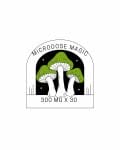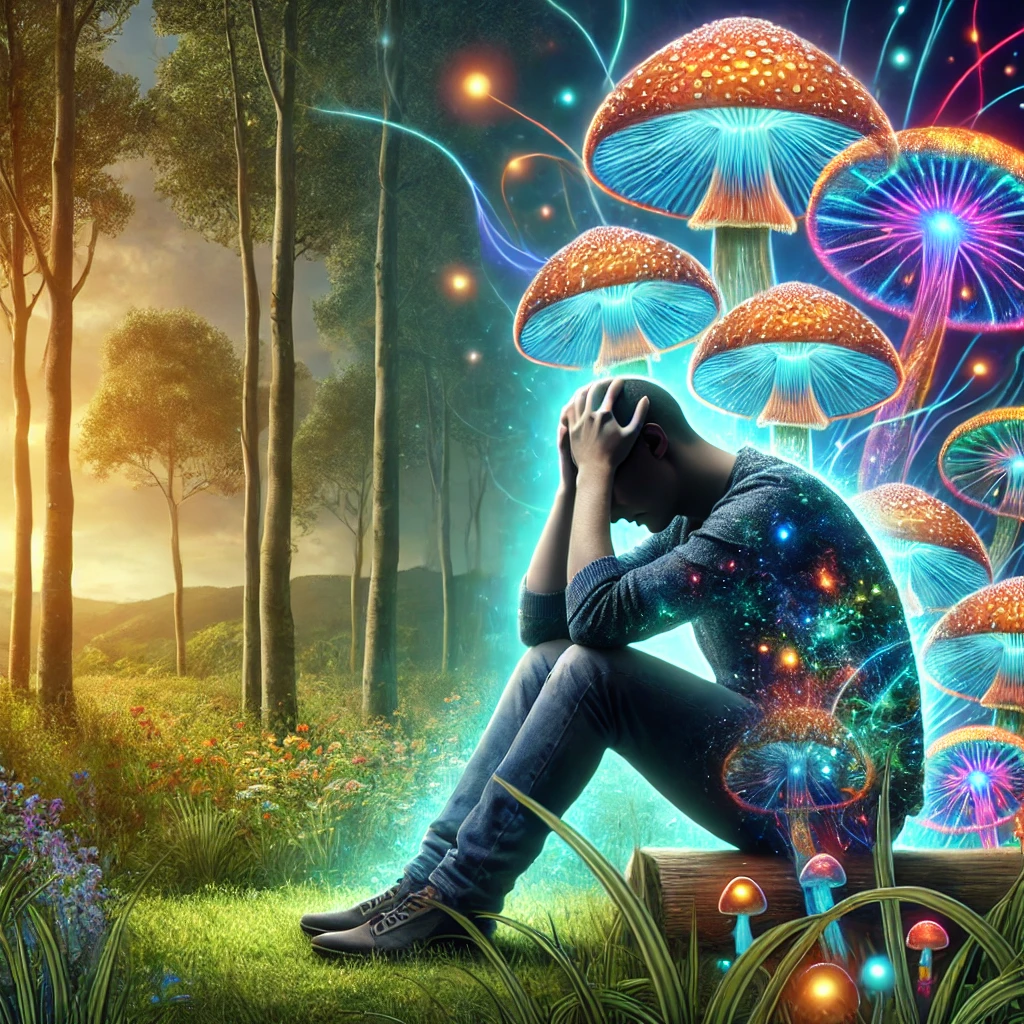Magic Mushrooms For PTSD
Introduction: Can Magic Mushrooms Help With PTSD?
Post-Traumatic Stress Disorder (PTSD) affects thousands of Canadians, from military veterans to trauma survivors. While traditional treatments like therapy and medication can help, many find them ineffective or incomplete. Magic mushrooms for PTSD may be the next alternative step for some people. Remember everyone is different so please be advised.
Now, research suggests that psilocybin—the active compound in magic mushrooms—may offer groundbreaking relief for PTSD sufferers. Could psychedelics be the future of trauma healing? Let’s explore the science, benefits, and how Canadians can access psilocybin therapy. A lot more people are turning to use magic mushrooms for PTSD.
The Science Behind Magic Mushrooms for PTSD
Magic mushrooms work by interacting with serotonin receptors in the brain, promoting neuroplasticity and emotional processing. Unlike conventional antidepressants that mask symptoms, psilocybin helps users confront and reprocess traumatic memories in a more manageable way. Magic mushrooms, specifically the active compound psilocybin, work by interacting with serotonin receptors in the brain, particularly the 5-HT2A receptor. This interaction promotes neuroplasticity, which is the brain’s ability to form new neural connections, and enhances emotional processing. By temporarily altering the brain’s connectivity patterns, psilocybin enables individuals to break free from rigid thought patterns and gain new perspectives on their emotional experiences.
Unlike conventional antidepressants, which primarily work by regulating neurotransmitter levels to mask symptoms, psilocybin offers a more transformative approach. It doesn’t simply dull emotional pain, but instead helps users confront and reprocess traumatic memories in a more manageable and less overwhelming way. This process allows individuals to reframe their trauma, integrate it into their broader life narrative, and, in some cases, experience a sense of emotional release or catharsis.
Furthermore, research suggests that psilocybin can enhance the brain’s ability to integrate emotions and memories that were previously too difficult to face, helping individuals gain insight into their past trauma. This therapeutic experience has shown promise in clinical trials, with many participants reporting significant reductions in PTSD symptoms, emotional numbness, and intrusive thoughts. By encouraging self-reflection and emotional processing, magic mushrooms provide a novel and potentially groundbreaking way to address PTSD at its root rather than simply managing symptoms.
Key Benefits of Psilocybin for PTSD:
1. Reduces fear response – Helps trauma survivors revisit painful memories without severe distress.
2. Encourages emotional openness – Many report feeling a newfound sense of self-acceptance.
3. Promotes neuroplasticity – Allows the brain to form new, healthier pathways.
4. Long-term effects – Unlike daily medications, some studies show lasting relief from just a few psilocybin sessions.
A study from Johns Hopkins University found that psilocybin therapy led to significant reductions in PTSD symptoms in 80% of participants, with effects lasting for months after treatment.
Read more: Learn about microdosing and its mental health benefits
Personal Stories: Real People, Real Results
Many Canadians are turning to magic mushrooms after exhausting conventional PTSD treatments. Users report fewer nightmares, reduced anxiety, and an improved ability to process past trauma after using psilocybin in a safe setting.
While microdosing offers subtle, day-to-day relief, full psychedelic sessions—often in therapeutic environments—can provide deep emotional breakthroughs.
Curious about microdosing? Shop magic mushroom microdoses in Canada (Here)
Is Psilocybin Therapy Legal in Canada?
As of now, magic mushrooms remain a controlled substance under Canadian law. However, there are exceptions:
- Special Access Program (SAP): Some patients can receive psilocybin therapy legally through Health Canada’s SAP.
- Clinical Trials: Canada is conducting various studies on psilocybin for PTSD and depression.
- Therapeutic Exemptions: Some individuals with severe PTSD have been granted legal access to psilocybin treatment.
While full legalization has not yet happened, many experts believe that psilocybin-assisted therapy could become widely available in Canada soon. However we are in the grey area for magic mushrooms. This allowing us Canadians to still order without any major consequences. Order magic mushrooms in Canada online now with us at microdosemagic.ca
Stay informed: Check out the latest updates on psilocybin legalization in Canada
How to Safely Explore Psilocybin for PTSD
If you’re considering magic mushrooms for PTSD, it’s important to do your research and start safely. Here are some key steps:
- Consider Microdosing
Many people with PTSD begin with microdosing—taking small, sub-perceptual doses of psilocybin to gently improve mood and cognitive function.
Explore: Microdosing magic mushrooms for mental clarity
2. Create a Safe Setting
For higher doses, ensure you’re in a calm, comfortable environment with a trusted sitter or therapist.
3. Start with a Trusted Source
Always buy from reputable, high-quality sources to ensure safe and effective experiences.
Ready to begin? Order magic mushrooms in Canada
Final Thoughts: A New Path to Healing
Recent research and personal accounts have illuminated the potential of psilocybin—the active compound in “magic mushrooms”—as a therapeutic agent for Post-Traumatic Stress Disorder (PTSD). While not a definitive cure, psilocybin-assisted therapy offers promise for those who have not found relief through traditional treatments.
In Canada, the momentum toward integrating psilocybin into therapeutic practices is gaining traction. Clinical trials, such as those led by the University of Toronto, are investigating the effects of microdosing psilocybin to treat depression, which often co-occurs with PTSD. Participants have reported improvements in cognitive function and emotional well-being, suggesting broader applications for trauma-related disorders.
Personal narratives further underscore psilocybin’s potential. For instance, a British Columbia resident, John Sayer, attributes his recovery from severe PTSD to microdosing psilocybin. After a life-altering accident, he experienced significant trauma-related symptoms but found relief through this approach, highlighting the compound’s capacity to facilitate emotional processing and healing.
bcruralhealth.org
Clinical psychologists are increasingly advocating for the inclusion of psilocybin in trauma therapy. The compound’s ability to promote neuroplasticity may aid patients in confronting and integrating traumatic memories more effectively, offering a new avenue for those whose conditions have not improved with conventional methods.
Internationally, the therapeutic potential of psilocybin is also being recognized. A retreat in Mexico provided U.S. first responders with psilocybin therapy to address trauma, resulting in reduced emotional distress and enhanced mental clarity among participants. These outcomes suggest that psilocybin may offer significant benefits in treating PTSD.
Despite these promising developments, psilocybin remains a controlled substance in many regions, including Canada. Ongoing research and advocacy are crucial to establishing its safety and efficacy profiles, potentially paving the way for regulatory changes that would allow broader therapeutic use.
In summary, while psilocybin is not a panacea for PTSD, accumulating evidence points to its potential as a valuable tool in mental health treatment. As research advances and societal perceptions evolve, psilocybin-assisted therapy may become a viable option for those seeking alternative avenues for healing.
While magic mushrooms are not a “magic bullet” for PTSD, research and personal experiences suggest they offer real hope where conventional treatments fall short. As Canada moves toward greater acceptance of psilocybin therapy, those suffering from PTSD may soon have a new, science-backed option for healing.
Would you consider using psilocybin for PTSD? Share your thoughts in the comments below!

